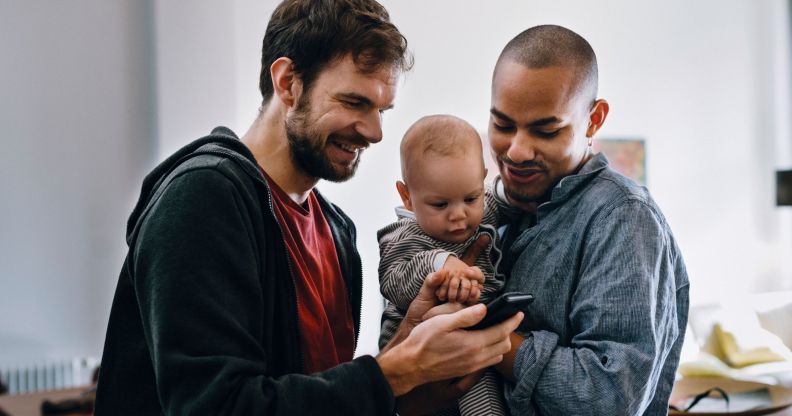Adoption discrimination ‘holding back’ potential LGBTQ+ families in US

LGBTQ+ couples and adults looking to adopt say that fear of discrimination is a major barrier in going through with it. (Getty)
A US study has found that LGBTQ+ couples are significantly more likely to foster or adopt than straight couples, but many have concerns about discrimination they may face during the process.
Research, published on Wednesday (24 January), found that 37 per cent of LGBTQ+ adults have considered fostering a child, while 32 per cent have seriously considered adoption.
Meanwhile, just 23 per cent of non-LGBTQ+ adults have considered fostering a child while 15 per cent have thought about adoption.
Commissioned as part of a research project on Americans’ views of US foster care, by analytical company Gallup, and Kidsave, an organisation that finds families for older children, the results were collected between March and April last year.
Gallup senior researcher Sarah Fioroni told PinkNews that the findings were “in line with our broad hypothesis” that “many Americans interested in fostering and adopting may be intimidated to get involved because of their fear of discrimination they may face in the process”.
More than a third of LGBTQ+ Americans said that fear was a major barrier to attempting to foster or adopt, while just 10 per cent of non-LGBTQ+ adults shared a similar view.
The concern over discrimination was more prevalent among LGBTQ+ men, according to the survey, with around 46 per cent saying it was a major barrier, compared with 22 per cent of women.
As a result, 44 per cent of LGBTQ+ women surveyed said they have either thought a lot or have taken steps towards adopting or fostering – compared with 29 per cent of men.
More than 40 per cent of LGBTQ+ adults believe adoption is not equally accessible
Gallup noted that, as of 2021, there are believed to be nearly 400,000 children in the US foster care system, with around 100,000 urgently needing permanent families.
Barriers faced by queer adults looking to adopt is “holding back potentially millions of [LGBTQ+] families and individuals who are serious about caring for children in need of a home,” the report concluded.
One of those families, Eden Rogers and Brandy Welch, sued the state of South Carolina after being turned away by a government-funded foster care agency because they are LGBTQ+.
Miracle Hill, South Carolina’s largest state-contracted foster care agency, reportedly rejected the application because of a “doctrinal statement” which includes a section that states: “God’s design for marriage is the legal joining of one man and one woman.”
Supported by Lambda Legal and the American Civil Liberties Union, the couple sued in 2019, claiming that the government had approved discriminatory practices by allowing religious criteria to dictate whether a couple was allowed to adopt.
Late last year, a court denied a motion for summary judgement, essentially allowing South Carolina to continue working with the adoption agency.
Gallup’s research showed that 41 per cent of LGBTQ+ adults agreed that adoption is not equally accessible for all interested adoptive adults regardless of sexual orientation.
21 per cent of non-LGBTQ+ adults agreed that adoption is not equally accessible, while 26 per cent said they believe it is equally accessible.
Shantay Armstrong, the leader of the Embrace Project, a Kidsave-driven diversity and equity initiative working to improve outcomes for Black and marginalised foster youth, said that starting out in foster care can be “intimidating” for LGBTQ+ adults.
“At Kidsave, we have worked with LGBTQ+ adults who previously encountered discrimination on their journeys to create a family. In the United States, we are encouraged that federal legislation is in the works to prevent discrimination against LGBTQ+ individuals, but we also know that culture change can lag behind policy change and takes time.”
As part of a package of protections for adults interested in adopting and fostering, the Biden administration announced in September that it would expand access to legal services for children and families at risk of entering the child welfare system and impose further protections for LGBTQ+ youth in foster care.
In a statement, the White House said it would direct the Department of Health and Human Services to “protect LGBTQI+ youth in the foster care system”, by proposing a rule that would prevent “mistreatment related to their sexual orientation or gender identity”.
However, the government needs to “remove negative stereotypes” about LGBTQ+ families and various other marginalised groups, Armstrong said.
“It would also help to provide anti-bias training and curriculum to mandatory reporters and caseworkers, and assist with reducing barriers for families by providing mental health resources and eligibility training.”

